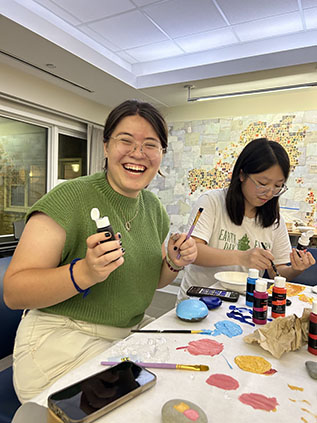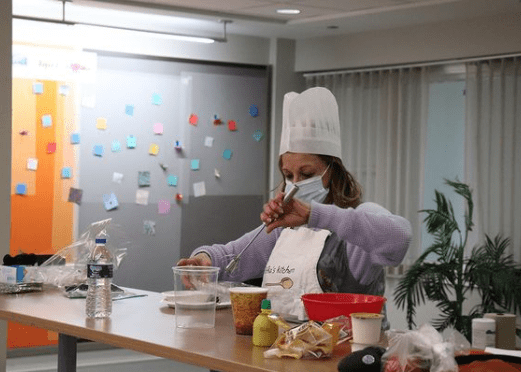Myrna García Hopes to Celebrate Students in Faculty-in-Residence Role
This role is a chance to get to know students in all their intersectionality and to foster a sense of belonging.”
Assoc. Prof. Myrna García
Faculty-in-Residence
Latina & Latino Studies Professor Creates Home Away from Home for South Area Students
Assoc. Prof. Rifka Cook spent more than half a decade as a Faculty-in-Residence (FIR) in the South Area with students of all nationalities, cultures and backgrounds; creating an environment of inclusivity, equity and diversity among students living in Northwestern’s residence halls.
“If you leave the house hungry, it’s your fault,” Cook said. “Even before I became a Faculty-in-Residence, I invited students for Shabbat dinners on Friday evenings. Some of them continued coming once or twice a month for years because they wanted to have that family gathering experience.”
Cook left Northwestern this summer, retiring after a teaching career that spanned more than 50 years. The Venezuela native spent the last 22 years in the Department of Spanish and Portuguese in the Weinberg College of Arts and Sciences.
Myrna García, associate professor in the Latina & Latino Studies program, stepped into Cook’s shoes at Allison Hall this fall.
 “People always told me that I would thrive at a small, liberal arts school because of the connection we can build with students, but at Northwestern, I think this program helps create that experience,” García said. “We get to know students as people, their interests, vulnerabilities and start to develop trust.”
“People always told me that I would thrive at a small, liberal arts school because of the connection we can build with students, but at Northwestern, I think this program helps create that experience,” García said. “We get to know students as people, their interests, vulnerabilities and start to develop trust.”
Each FIR hosts enriching and meaningful activities and events for residents, such as inviting students and faculty to dine together in a friendly environment with home cooking. Other activities include hosting lectures from visiting faculty, field trips to the museums, sports like bowling, events like writing thank you cards and cooking classes.
One Northwestern student said Cook’s Thanksgiving dinner was their first opportunity to experience the holiday after arriving in the United States for college. Another said Cook’s time as a FIR inspired her to “create a space where all feel welcome, no matter the circumstances.”
The FIR program was founded in 2010 and comprises five faculty members who live full-time in the residence halls. In addition to helping facilitate a smooth transition for first-year students, the program aims to encourage student engagement, enhance learning and strengthen students’ overall sense of community and connection to Northwestern.
“One of the reasons students choose Northwestern is because of our world-class faculty,” Residential Services Executive Director Carlos Gonzalez said. “We’re quite fortunate that we are able to lean on these remarkable individuals to help shape the experience of students in our residential spaces and create a sense of belonging on campus.”
The program allows each FIR to make the role a reflection of their own personality and interests. García said she looks forward to exploring the unique backgrounds of her students using a common language – food.
“I always try and find out what students miss the most about home and find a way to provide that,” García said. “One of my students and I shared a connection to Filipino cuisine because I used to live in San Diego. So, I went to a restaurant in Albany Park and ordered some lumpias for them, which is a Filipino delicacy. Even students who are not Filipino get to experience a new type of dish and build a connection to better understand each other.”
 Throughout her time as a Faculty-in-Residence, Cook said everything she did was steeped in gratitude. She invited García to speak to a group of students before she was even involved in the program.
Throughout her time as a Faculty-in-Residence, Cook said everything she did was steeped in gratitude. She invited García to speak to a group of students before she was even involved in the program.
“Rifka prepared a whole dinner and really helped me understand the importance of creating a space at Northwestern where nobody felt the pressure to get a grade or demonstrate expertise,” García said. “It felt very comfortable and inviting.”
With Cook’s legacy as a FIR in mind, García looks to instill the role with her own values and traditions.
“I have a nine-year-old daughter who’s obviously already very connected to higher education, and I’m excited to bring my whole self into it and have her participate,” García said. “In my role as an ethnic studies professor, we’re dealing with questions of race, power and gender—those are difficult topics. This role is a chance to get to know students in all their intersectionality and to foster a sense of belonging.”
